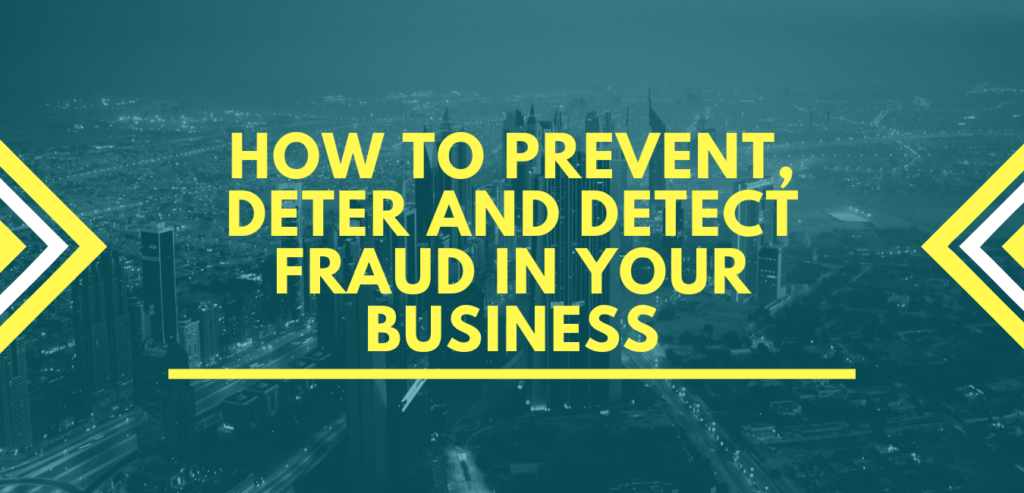How to Prevent, Deter and Detect Fraud in Your Business

How to Prevent, Deter and Detect Fraud in Your Business
“Fraud has a direct impact on your company’s bottom line. It also threatens your company’s hard-earned reputation.”
We have seen it all and we can help you become more savvy about preventing fraud and detecting it.
Overview:
- What is Fraud?
- What are some warning signs of Fraud?
- What are examples of Fraud?
- How can you prevent Fraud?
- How can we help?
What is Fraud?
Fraud can take on many forms:
Stealing money or merchandise
Taking kickbacks or bribes from suppliers or customers
Providing false financial information on the company to the government, creditors or investors
Cheating on expense accounts
Claiming overtime when it is not due
The above offenses are all “occupational fraud.” There are four elements to occupational fraud:
The activity is clandestine
It violates the employee’s duty of trust to the employer
It is committed for the purpose of direct or indirect financial gain
The employing organization loses assets, revenues or reserves
How to detect fraud in business?
Big spenders: Employees who seems to be spending outside of their means probably are. One cause of this could be fraud.
People with financial problems: Just like big spenders, people with financial problems may be more motivated to commit occupational fraud examples.
Rule breakers: People who ignore company rules and regulations set a bad example and can trigger fraud throughout the company.
How to prevent fraud in business?
Retail fraud: An employee working at the sales counter has been stealing sweaters for months.
Bookkeeping fraud: Your longtime bookkeeper has been authorizing checks to herself and recording them as “consulting expenses.”
Purchasing fraud: Your buyer has been purchasing items with the company’s money for his own side fraud examples in business.
Prevent business expense fraud: Your leading salesperson has been expensing hotel stays and “client dinners” while on personal vacations.
How can you prevent Fraud?
Create and maintain a culture of honesty and high ethics. Set the tone at the top by setting achievable goals and expressing “zero tolerance” for unethical behavior. Also, train employees regularly regarding the company’s values and code of conduct.
Have strong system controls. Identify ways to increase security in your computer, record keeping, and payment systems.
Pay attention to the warning signs on the books. Create internal mechanisms that alert you to potential transgressions.
Report irregularities. Create a system for employees to anonymously report illegal or unethical actions they have witnessed or suspect.
How can we help?
Conduct a fraud audit
Conduct a systems audit
Help you evaluate and tighten internal controls
Work with you to monitor non-financial measures
In a recent study of fraud
small organizations (100 employees or fewer) actually suffer larger median losses from fraud than large organizations (with 10,000 plus employees.) In fact, small companies are over 100 times more vulnerable to fraud than their largest counterparts. However, our professionals can help you assess your risks and create safeguards.
We hope you found this article about “How to Prevent, Deter and Detect Fraud in Your Business” helpful. If you have questions or need expert tax or family office advice that’s refreshingly objective (we never sell investments), please contact us or visit our Family office page or our website at www.GROCO.com. Unfortunately, we no longer give advice to other tax professionals gratis.
To receive our free newsletter, contact us here.
Subscribe our YouTube Channel for more updates.

Alan Olsen, is the Host of the American Dreams Show and the Managing Partner of GROCO.com. GROCO is a premier family office and tax advisory firm located in the San Francisco Bay area serving clients all over the world.
Alan L. Olsen, CPA, Wikipedia Bio

GROCO.com is a proud sponsor of The American Dreams Show.

The American Dreams show was the brainchild of Alan Olsen, CPA, MBA. It was originally created to fill a specific need; often inexperienced entrepreneurs lacked basic information about raising capital and how to successfully start a business.
Alan sincerely wanted to respond to the many requests from aspiring entrepreneurs asking for the information and introductions they needed. But he had to find a way to help in which his venture capital clients and friends would not mind.
The American Dreams show became the solution, first as a radio show and now with YouTube videos as well. Always respectful of interview guest’s time, he’s able to give access to individuals information and inspiration previously inaccessible to the first-time entrepreneurs who need it most.
They can listen to venture capitalists and successful business people explain first-hand, how they got to where they are, how to start a company, how to overcome challenges, how they see the future evolving, opportunities, work-life balance and so much more..
American Dreams discusses many topics from some of the world’s most successful individuals about their secrets to life’s success. Topics from guest have included:
Creating purpose in life / Building a foundation for their life / Solving problems / Finding fulfillment through philanthropy and service / Becoming self-reliant / Enhancing effective leadership / Balancing family and work…

MyPaths.com (Also sponsored by GROCO) provides free access to content and world-class entrepreneurs, influencers and thought leaders’ personal success stories. To help you find your path in life to true, sustainable success & happiness. It’s mission statement:
In an increasingly complex and difficult world, we hope to help you find your personal path in life and build a strong foundation by learning how others found success and happiness. True and sustainable success and happiness are different for each one of us but possible, often despite significant challenges.
Our mission at MyPaths.com is to provide resources and firsthand accounts of how others found their paths in life, so you can do the same.
How Can I Sustain My Family Wealth?
How Can I Sustain My Family Wealth? At GROCO we work with some of the most successful and wealthiest people in the world. We’ve seen a lot of clients come through our doors and we’ve learned a lot about what makes them successful. We’ve also enjoyed much success in our own right. Our clients have…
Wealth Building: Six Keys
Wealth Building: Six Keys By Scott Hove There are keys to wealth and success that those who have attained them understand. If you wish to build wealth and achieve success then it’s crucial to implement the keys discussed below. Here, then, are six things that the successful understand and implement. As you read them, please…
Real Estate Investing: Lease Options Offer Multiple Profit Opportunities
Real Estate Investing: Lease Options Offer Multiple Profit Opportunities By Jordan Taylor Mention “real estate investing strategies” and the first thing that typically comes to mind is buying and selling. But a strategy often overlooked and underutilized is the option—and the smart use of options can generate some fast and impressive profits. An option…
Behavioral Finance: Beyond Greed and Fear
Behavioral Finance: Beyond Greed and Fear “Modern portfolio theory,” a complex mathematical system explaining the workings of the financial markets, has been quite influential on the thinking of investment managers over the last quarter century. The theory derives from the work of a handful of finance professors, several of whom were awarded Nobel Prizes for…




